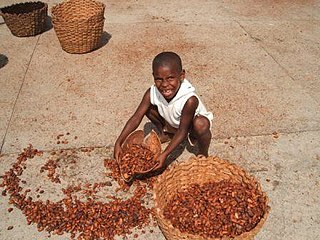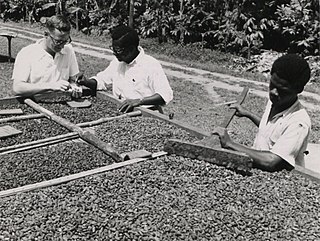
Chocolate or cocoa is a food made from roasted and ground cocoa seed kernels that is available as a liquid, solid, or paste, either on its own or as a flavoring agent in other foods. Cocoa has been consumed in some form for at least 5,300 years starting with the Mayo-Chinchipe culture in what is present-day Ecuador. Later, Mesoamerican civilizations also consumed chocolate beverages, and it was introduced to Europe in the 16th century.

Fair trade is a term for an arrangement designed to help producers in developing countries achieve sustainable and equitable trade relationships. The fair trade movement combines the payment of higher prices to exporters with improved social and environmental standards. The movement focuses in particular on commodities, or products that are typically exported from developing countries to developed countries but is also used in domestic markets, most notably for handicrafts, coffee, cocoa, wine, sugar, fruit, flowers and gold.

The cocoa bean, also known simply as cocoa or cacao, is the dried and fully fermented seed of Theobroma cacao, the cacao tree, from which cocoa solids and cocoa butter can be extracted. Cacao trees are native to the Amazon rainforest. They are the basis of chocolate and Mesoamerican foods including tejate, an indigenous Mexican drink.

The Harkin–Engel Protocol, sometimes referred to as the Cocoa Protocol, is an international agreement aimed at ending the worst forms of child labor and forced labor in the production of cocoa, the main ingredient in chocolate. The protocol was negotiated by U.S. Senator Tom Harkin and U.S. Representative Eliot Engel in response to a documentary and multiple articles in 2000 and 2001 reporting widespread child slavery and child trafficking in the production of cocoa. The protocol was signed in September 2001. Joint Statements in 2001, 2005 and 2008 and a Joint Declaration in 2010 extended the commitment to address the problem.

Child labour is a recurring issue in cocoa production. Ivory Coast and Ghana, together produce nearly 60% of the world's cocoa each year. During the 2018/19 cocoa-growing season, research commissioned by the U.S. Department of Labor was conducted by NORC at the University of Chicago in these two countries and found that 1.48 million children are engaged in hazardous work on cocoa farms including working with sharp tools and agricultural chemicals and carrying heavy loads. That number of children is significant, representing 43 percent of all children living in agricultural households in cocoa growing areas. During the same period cocoa production in Cote d’Ivoire and Ghana increased 62 percent while the prevalence of child labour in cocoa production among all agricultural households increased 14 percentage points. Attention on this subject has focused on West Africa, which collectively supplies 69% of the world's cocoa, and Côte d'Ivoire, supplying 35%, in particular.

Equal Exchange is a for-profit, Fairtrade, worker-owned cooperative headquartered in West Bridgewater, Massachusetts. Equal Exchange distributes organic, gourmet coffee, tea, sugar, bananas, avocados, cocoa, and chocolate bars produced by farmer cooperatives in Latin America, Africa, and Asia. Founded in 1986, it is the oldest and largest Fair Trade coffee company in the United States. The highest paid employee of Equal Exchange may not make more than four times what the lowest paid employee receives.

UTZ, formerly called UTZ Certified, is a program and a label for sustainable farming. The organization was founded as a non-profit in the Netherlands in 2002. The UTZ label is featured on more than 10,000 product packages in over 116 countries. In 2014, UTZ was reported to be the largest program for sustainable farming of coffee and cocoa in the world. The UTZ program addresses agricultural practices, social and living conditions, farm management, and the environment. In January 2018, UTZ officially merged with the Rainforest Alliance in response to the increasing challenges of deforestation, climate change, systemic poverty, and social inequity.
Barry Callebaut AG is a Swiss-Belgian cocoa processor and chocolate manufacturer, with an average annual production of 2.3 million tonnes of cocoa & chocolate . It was created in 1996 through the merging of the French company Cacao Barry and the Belgian chocolate producer Callebaut. It is currently based in Zürich, Switzerland, and operates in over 30 countries worldwide. It was created in its present form by Klaus Johann Jacobs.

Agriculture is one of the main industries in Taiwan. It contributes to the food security, rural development and conservation of Taiwan. Around 24% of Taiwan's land is used for farming.

Ivory Coast leads the world in production and export of the cocoa beans used in the manufacture of chocolate. Despite producing over 45% of the world’s cocoa and receiving only about 4% of the $100 billion chocolate industry revenue, the 'Sweet Revolution' in Ivory Coast aims to create a fairer and more sustainable cocoa industry.
The "Faces of Freedom" photo exhibition is a collection of photographs captured by photo-journalist, filmmaker and human rights educator U. Roberto (Robin) Romano, during his travels to India, Nepal and Pakistan. Romano explores the exploitation of child labor in the production of handmade rugs in coordination with multiple international organizations, such as the World Bank, UNICEF, International Labour Organization and others to reduce the number of child laborers in that industry. The exhibit has been shown in many United States cities since its first exhibit in 2009. Faces of Freedom has been included in CNN Freedom Projects of modern slavery.
The International Cocoa Organization (ICCO) is a global organization, composed of both cocoa producing and cocoa consuming countries with a membership. Located in London, ICCO was established in 1973 to put into effect the first International Cocoa Agreement which was negotiated in Geneva at a United Nations International Cocoa Conference. There have since been seven Agreements. The Seventh International Cocoa Agreement was negotiated in Geneva in 2010 and came into force provisionally on 1 October 2012.
The environmental impact of cocoa production includes deforestation, soil contamination, and herbicide resistance. The majority of cocoa farms are now located in Côte d'Ivoire and Ghana.

Fair trade cocoa is an agricultural product harvested from a cocoa tree using a certified process which is followed by cocoa farmers, buyers, and chocolate manufacturers, and is designed to create sustainable incomes for farmers and their families. Companies that use fair trade certified cocoa to create products can advertise that they are contributing to social, economic, and environmental sustainability in agriculture.

Ghana is the second-largest exporter of cocoa beans in the world, after Ivory Coast. Ghana's cocoa cultivation, however, is noted within the developing world to be one of the most modelled commodities and valuables.
The World Cocoa Foundation is a non-profit membership organization with more than 90 member companies striving to make the cocoa supply chain more sustainable. WCF and its members are criticized for doing too little to end child labor, deforestation and extreme poverty, with their efforts dismissed as greenwashing and “a remarkable failure”. WCF's membership includes chocolate manufacturers such as Mondelez International, Nestlé, The Hershey Company and Mars, Inc. cocoa producers and suppliers such as Barry Callebaut and Cargill, shipping companies and ports and retailers such as Starbucks.

Tony's Chocolonely is a Dutch chocolate company founded in 2005 that produces and sells chocolate. In 2018, the company's market share in the Netherlands was 18 percent, making it one of the country's largest chocolate manufacturers.
The chocolate industry in the Philippines developed after the introduction of the cocoa tree to Philippine agriculture. The growing of cacao or cocoa boasts a long history stretching from the colonial times. Originating from Mesoamerican forests, cacao was first introduced by the Spanish colonizers four centuries ago. Since then the Philippine cocoa industry has been the primary producer of cocoa beans in Southeast Asia. There are many areas of production of cacao in the Philippines, owing to soil and climate. The chocolate industry is currently on a small to medium scale.
The Côte d'Ivoire–Ghana Cocoa Initiative (CIGCI) is an intergovernmental organisation of cocoa-producing countries. It was founded in 2018 by its two eponymous member countries, Côte d'Ivoire and Ghana, to jointly influence global cocoa prices and the chocolate market. Its proclaimed goal is to increase the revenues of cocoa farmers in its member countries in a sustainable manner. Critics have described the organisation as a "cocoa cartel" and nicknamed it "COPEC", a reference to the oil cartel OPEC.
The spread of cocoa cultivation in Ivory Coast was significantly influenced by France's interventionist and restrictive colonial policies. Unlike other West African producers, the large-scale diffusion of cocoa occurred later in Ivory Coast, where coffee cultivation was also integrated with cocoa farming starting in the 1930s. This approach fostered a distinct "pioneer front" for cocoa cultivation, particularly between the 1950s and 1980s, which rapidly expanded from the center to the south-west of the Ivorian forest zone.









